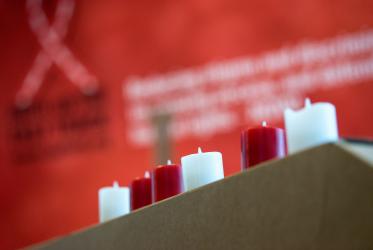The World Council of Churches - Ecumenical Advocacy Alliance (WCC-EAA) applauds the first licensing agreement related to tuberculosis, announced on 25 January by the Medicines Patent Pool (MPP) and Johns Hopkins University. The agreement will facilitate the clinical development of sutezolid, a tuberculosis (TB) drug candidate. The antibiotic sutezolid, in combination with other drugs, could be used to more effectively treat drug-sensitive and drug-resistant tuberculosis.
In welcoming the agreement, Francesca Merico, WCC-EAA HIV Campaign coordinator, highlighted the fact that “Tuberculosis remains the leading cause of death in people living with HIV – the burden is particularly high in Asia, Africa and Eastern Europe, and we welcome the fact that this is a world-wide licence.”
WHO reports that people living with HIV are 17-22 times more likely to develop TB than HIV-negative people. TB is the most common illness among people living with HIV, including among those taking antiretroviral treatment, and it is the major cause of HIV-related deaths. Sub-Saharan Africa bears the burden of the dual epidemic, accounting for approximately 75% of all deaths from HIV-associated TB in 2015.
Pat Zerega, chair of the WCC-EAA Access to Treatment Working Group, added: “All these deaths are avoidable! TB is a treatable and curable disease, but today's TB treatments are too complicated to administer and can be toxic and we are facing an increase in drug-resistant TB due to people not taking the full treatment because of pill burden or people being infected with drug-resistant TB.”
“The world needs new and better regimens to treat TB” says Astrid Berner-Rodoreda, HIV policy advisor for the German Protestant development agency Bread for the World. “Today’s tuberculosis drugs are inadequate to tackle the TB pandemic. This licensing agreement gives hope to accelerate the development of much-needed TB treatments that are simpler and affordable.”
The MPP negotiates with pharmaceutical companies to share their HIV medicine patents with the pool, and then licenses generic manufacturers to facilitate the production of affordable HIV, TB and Hepatitis C medicines well-adapted for use in resource-poor settings. To date, the MPP has signed agreements with eight patent holders for twelve HIV antiretrovirals, an HIV technology platform, one hepatitis C direct-acting antiviral and one tuberculosis treatment. Its generic partners have distributed four billion doses of low-cost medicines to 125 countries.
The Ecumenical Advocacy Alliance, an ecumenical initiative of the World Council of Churches, is a global network of churches and related organizations committed to campaigning together on common concerns for justice and human dignity. Current campaign issues are HIV and AIDS, food security and sustainable agriculture.
HIV-positive TB cases
1.2 million people living with HIV estimated to have fallen ill with TB in 2015.
Deaths
0.4 million people living with HIV estimated to have died from TB, a preventable and curable disease.








